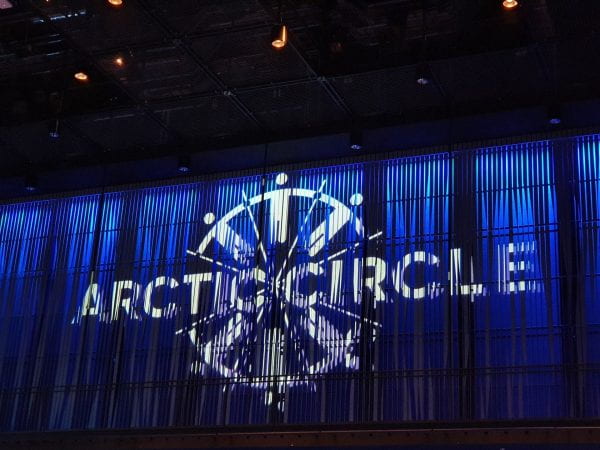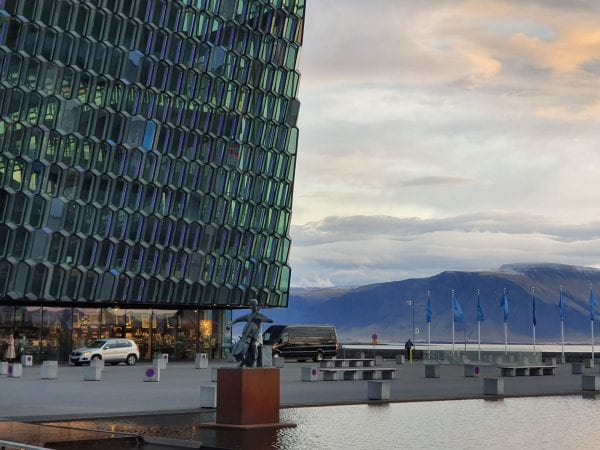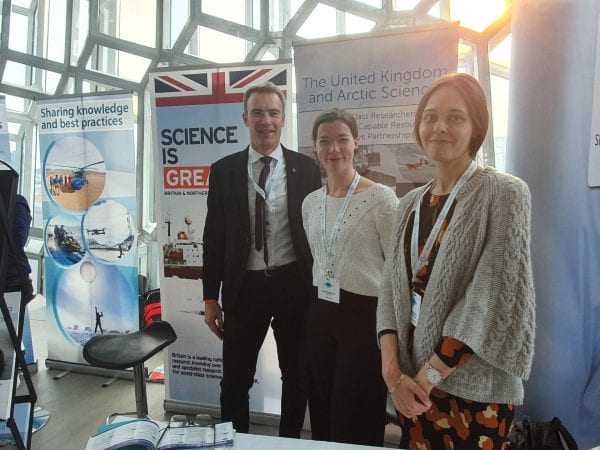
Dr Kate Hendry, Associate Professor in Geochemistry at the School of Earth Sciences, University of Bristol
The Arctic is one of the most rapidly changing regions on Earth. Its lands and oceans are undergoing unprecedented transitions, from permafrost melting to sea ice thinning, and its people are vulnerable to the knock-on effects of climate change.
At the same time, Arctic governments (state, regional and local) are looking towards the future of economic development, broadened participation and connectivity, and improved health and education. All of these socioeconomic and environmental challenges are going on against the background of a complex governance structure and heightened geopolitical pressures.

Harpa, Reykjavik, the location of the Arctic Circle Assembly
Unlike the Antarctic, there is no one treaty or agreement that underpins Arctic governance, which is instead reliant on the Arctic Council and a plethora of bilateral and multilateral agreements.
The Arctic Circle is a not-for-profit organisation that forms the largest “network of international dialogue and cooperation on the future of the Arctic”, with the ambitious aim to promote open discussion between state and non-state players, including the private sector, universities, think tanks, environmental and conservation associations, Indigenous communities, and interested members of the public.

L-R: Henry Burgess, Head of the UK Arctic Office; Rosa Degerman, UK Science and Innovation Network in Finland; and Tatiana Iakovleva UK Science and Innovation Network in Russia
As part of a PolicyBristol project, joint with the UK Arctic Office (under the Natural Environment Research Council) and UK Science and Innovation, I was fortunate to attend the Arctic Circle Assembly in Reykjavik this October. I was thrust into a steep learning curve of Arctic governance and policy strategies from representatives of governments (from Arctic states, to non-Arctic countries such as Switzerland, Singapore and Japan), devolved authorities (including the first ever panel discussion with Greenland’s first generation of representative diplomats, and the announcement of Scotland’s Arctic policy document), and NGOs.
All of these policy announcements and discussions were focused around the dual themes of sustainable development and environmental protection, with the ever present shadow of rapid climatic change.
Private sector representatives with an interest in the Arctic included companies promoting their climate change solutions, from renewables to climate altering technologies (or geoengineering), from manipulating glaciers, to restoring Arctic sea ice, to fixing carbon dioxide in rocks.
There were also powerful and inspiring talks from Indigenous peoples’ representatives, emphasising the desire for self-determination (“Nothing about us without us”) and the essential need to co-produce strategies towards sustainable development and scientific endeavours, embracing full collaboration with Indigenous rights holders and respecting their cultural heritage.
And scientists can play their part. The IPPC special report on the oceans and cryosphere in a changing climate (SROCC published in September 2019) brought together thousands of peer-reviewed publications across natural and social sciences, highlighting the current threats to the polar regions. The SROCC featured heavily in the Assembly – mentioned by most policy makers’ presentations – and a focus of a dedicated discussion session with the leading authors of the polar regions chapter.
However, one of the challenges faced by the report authors was the limitation within the IPCC framework of using only peer-reviewed materials. The vast majority of Indigenous Knowledge (IK) is not written in peer-reviewed journal articles, leaving us with the question of how these vital approaches can be incorporated in the future.
The changing Arctic will have profound impacts not only on the ecosystems and communities of the Arctic states, but will be felt globally through climate teleconnections and an growing global economy. The solutions to climatic change are complex, and need multiple strategies, unified international cooperation, co-production with local communities, evidence-based policy decisions, and scientific diplomacy.
However, different stakeholders and rights holders have different governance structure and different priorities. Forums such as the Arctic Circle Assembly can start to bring everyone together to the debating table, but there is still a need to make sure that the good intentions are followed through with substantive action.
- Kate Hendry is an Associate Professor in Geochemistry at the University of Bristol, School of Earth Sciences, and member of the UK Arctic and Antarctic Partnership. With thanks to Henry Burgess (UK Arctic Office) and Michael Meredith (British Antarctic Survey).
